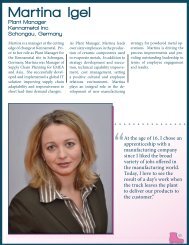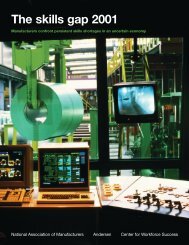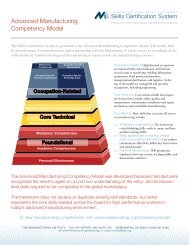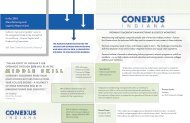2005 Skills Gap Report - Manufacturing Institute
2005 Skills Gap Report - Manufacturing Institute
2005 Skills Gap Report - Manufacturing Institute
You also want an ePaper? Increase the reach of your titles
YUMPU automatically turns print PDFs into web optimized ePapers that Google loves.
<strong>2005</strong> <strong>Skills</strong> <strong>Gap</strong> <strong>Report</strong><br />
Educators must produce graduates familiar with the world of<br />
work and the skills needed to be effective in it. Business/education<br />
collaborations are critical to help familiarize the teaching and<br />
counseling professions with the needs of business. Teachers and career<br />
counselors should engage in business externships, and certificate<br />
and associate degree programs in community colleges, and technical<br />
schools should be updated to the new 21 st century skill requirements.<br />
And because K-12 education is where it all begins, math and science<br />
should be emphasized in K-12 curricula with a focus on technology<br />
and innovation. State education standards should include career education<br />
as measurable criteria for K-12 results under the No Child Left<br />
Behind Act.<br />
Education and workforce policies must reflect the need for<br />
lifelong learning. Community colleges and technical schools should<br />
receive targeted public funding for workforce development because<br />
they are often the training provider of choice for employers. In addition,<br />
the Higher Education Act and its funding mechanisms should<br />
include a focus on the adult learner and lifelong learning. And, current<br />
legislation should be reauthorized to support lifelong learning.<br />
The fact is that the rules of the competitive race have been changed<br />
forever. With inexpensive access to Internet, broadband, and collaboration<br />
technology, historical barriers like geography no longer prevent<br />
small companies and skilled individuals from around the world from<br />
participating in local markets. As Craig Barrett, CEO of Intel said, “You<br />
don’t bring three billion people into the world economy overnight<br />
without huge consequences, especially from three societies (like India,<br />
China, and Russia) with rich educational heritages.”2<br />
This means that we are now facing an entirely new level of competition<br />
with no guarantees that the U.S. manufacturing base will remain<br />
strong. Plainly said, unless solutions to the skills gap issues are acted<br />
upon with great focus and determination, this country will likely be left<br />
behind in the global competitive race.<br />
Individuals must take responsibility for their employability.<br />
This is the millennium of the free-agent worker – a person who can go<br />
anywhere and do anything with the right kind of education and training.<br />
Individuals must accept their role in keeping their skills current<br />
and should understand that the value they bring to the workplace is<br />
contingent upon their commitment to lifelong learning – to keep their<br />
skills and their knowledge current.<br />
Clearly, good jobs require a high level of skill and reap good wages<br />
that support families, communities, and the nation. The nation’s competitiveness<br />
depends upon the manufacturing sector and the upwardly<br />
mobile jobs it provides. If manufacturers cannot find the skilled people<br />
they need here in the United States, jobs and industries will move to<br />
where they can find the skills.<br />
23







